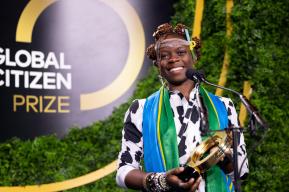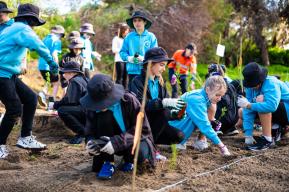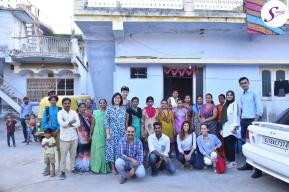Supported by UNESCO Green Citizens, The Ocean Purpose Project created by Mathilda D'Silva and GreenKayak co-founded by Oke Carstensen are innovative and committed to the fight against plastic pollution. The two founders presented their project to students from The English International School in Cotonou, Benin, The Phorms Schule Frankfurt/Taunus in Steinbach, Germany and The American School of Angola in Luanda, Angola.
Mathilda's mediatized life is turned upside down one day during a dragon boat competition, when, after prolonged contact with the water, she develops three autoimmune diseases that cause pigmentation spots on her skin and hair. It was an electroshock: if water pollution can affect her health in this way, no one is immune, and our food, water and bathing areas are at risk.
She then tries to gain a scientific understanding of how plastic molecules work and their impact on health and the environment. To be able to take action, she felt it was necessary to have as much research and knowledge as possible on the subject, not only from academic research but also from the testimonies of fish farmers, local fishermen, etc. The Ocean Purpose Project is therefore a logical step towards finding a solution for transforming water polluted by plastic micro-organisms into hydrogen, and thus creating energy.
She reminds the students who question her that every citizen can have an impact, and that to solve the problem of ocean pollution, we need clear communication and very detailed studies to identify the problem and realize its importance. Plastic accounts for almost 80% of ocean pollution, with repercussions for people and ecosystems alike. Individually, we can first change our behavior by regulating single-use plastic before it reaches our rivers and oceans.
If we want to make a change, we first have to look at the numbers, cause numbers don’t lie, look at the facts, look at the science, and then, from there, we have to come for a position of solution.
You don't have to be a researcher, a scientist or have done specific studies to understand the data; she invites students to show curiosity and believe in their ability to understand scientific data and act for change.
The concept behind GreenKayak is a “win-win”: having a good time by renting a kayak free of charge and taking a stroll along the river, picking up any garbage you come across! Oke Carstensen reminds us that when trash goes uncollected, it has negative effects on the environment, climate change, human health, etc., and that we need to take action every day.
By giving people the chance to get active and act collectively, he's counting on this project to educate people by offering them an enjoyable sustainable tourism experience; a point he believes is essential to prove that individual engagement matters.
You can do much more than you think. Don't be afraid to start somewhere. Always be persistent.
Since the launch, the 15,000 or so GreenKayak participants have collected 80 tons of trash, which still seems insignificant compared to the amount that ends up in the ocean every day. But there are no small actions, and even if all environments are different, actions taken for the environment can be inspiring and applicable to everyone, whether in the countryside, near a river, in the desert, on the coast, etc., because there's garbage everywhere.
Climate change is a problem that affects us all, but one that we can overcome by working together. Generally speaking, to slow down the effects of climate change, we need concrete action, and citizen action, particularly by young people, can make a difference.
This event was produced with the support of Klorane Botanical Foundation, Engie Foundation and 6C Conseil.
- Discover the next UNESCO Campus: https://www.unesco.org/en/campus
- To learn more about UNESCO Green Citizens projects: https://www.unescogreencitizens.org/fr/discover-projects/












